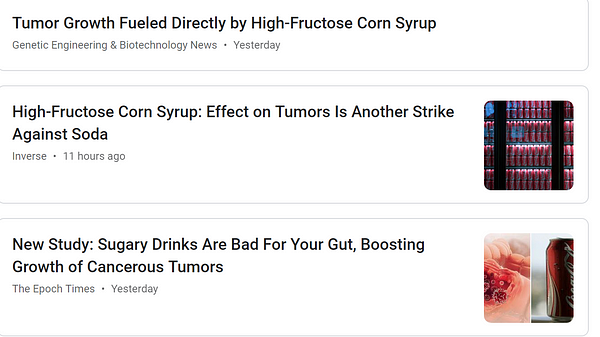Does High Fructose Corn Syrup Cause Colon Cancer?
Results of a recent study in mice need a little clarification.
The article caught my eye because it said that high fructose corn syrup (HFCS) “enhances tumor growth in mice” and it was published in the top-notch journal Science. The article mentions soft drinks and sugar sweetened beverages (SSBs) right in the abstract. It is no wonder that the general media got quite a rush from the story.
The study by Goncalves et al is a nice piece of work. The researchers used mice missing a key tumor suppressor as a model. Colorectal cancers develop from a well-described progression of genetic changes before cells become malignant. Researchers have developed mice that are missing some of the biochemical hardware that keep cells from becoming cancerous. They possess errors in a gene that represses one major step toward cancer, so they are prone to develop tumors. The researchers used these mice to perform the experiments, as the tumor-prone mice would be potentially more responsive to the treatment if there was a biological effect.
Researchers allowed the mice to chow down as much HFCS as they wanted, so the mice loaded up and got fat. They developed metabolic syndrome and tumors.
But were the tumors a function of obesity and metabolic syndrome? To test this the researcher raised the same mice on a more restricted diet, and delivered HFCS via oral gavage (force fed). Those mice maintained normal weight but developed more, larger tumors than controls.
The author do a nice job tracing glucose and fructose and looking at how they influence metabolic processes in intestinal cells. That’s all good stuff.
The problem is that throughout the report they hammer on SSBs and HFCS. I understand that because the Big Gulp is a potent HFCS delivery device. But free fructose is more prevalent in organic apple (>60 g/L) or grape (>80g/L) juice, the fanfared agave nectar (85% fructose) , or a good serving of health-haloed Manuka Honey. Soda (~50–60 g/L) may be a contributor, but it is not the sole culprit — the problem is that we consume a lot of sugar in everything from BBQ sauce to salad dressing, and we also consume a lot of fructose. The study shows that fructose is the problem, and it likely does not matter if it comes from HFCS, table sugar, or some sacred bee extract.
The take home lesson is that we should enjoy sweetness from whole fruits, not necessarily juices. The fiber of fruits slows their progression through digestion and the sugars are absorbed in the small intestine, long before they get into colon-cancerville. If we do drink juices (they are rich in vitamins and minerals) consider using the classical juice glass (1 serving of fruit, 4–6 fluid ounces) rather than the 2-liter commuter mug. This nice report should not be vilification of soda, it should be a reminder that fructose is ubiquitous, it can have health impacts independent of obesity and metabolic syndrome, and should best be limited in the diet.



